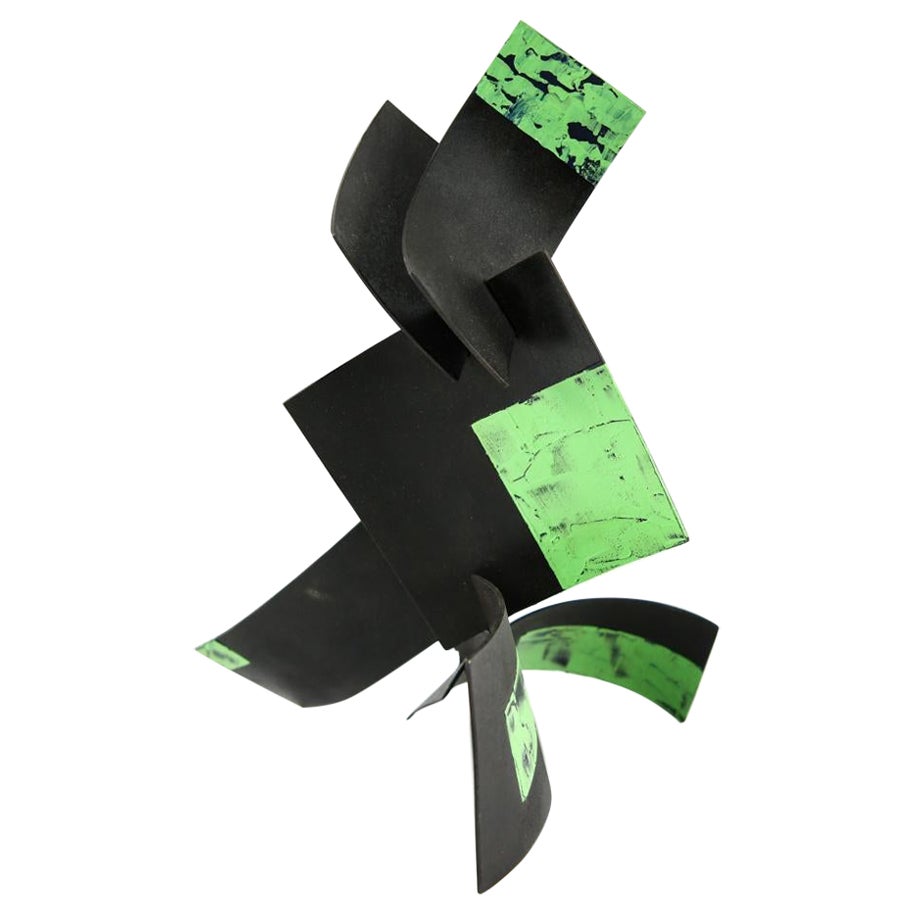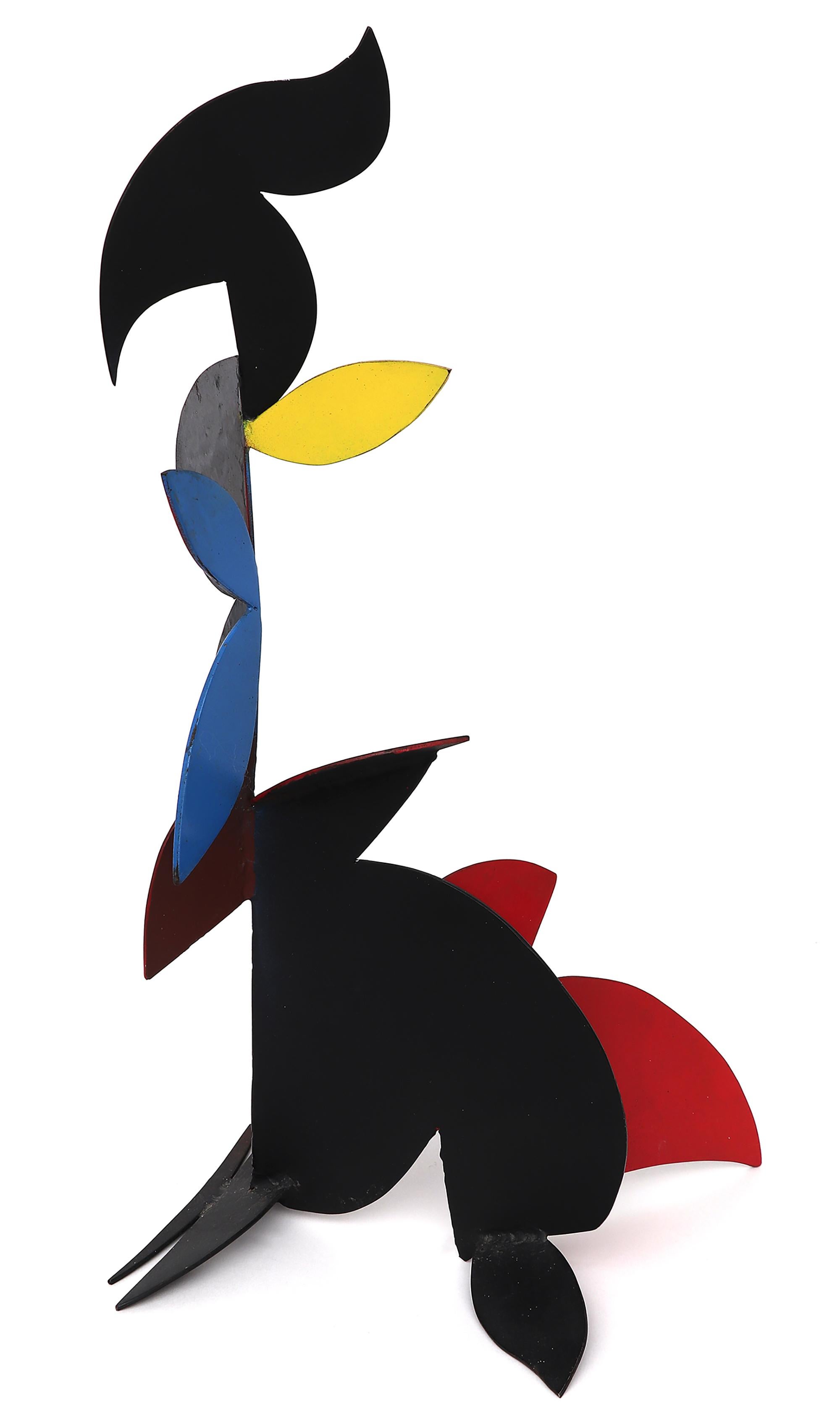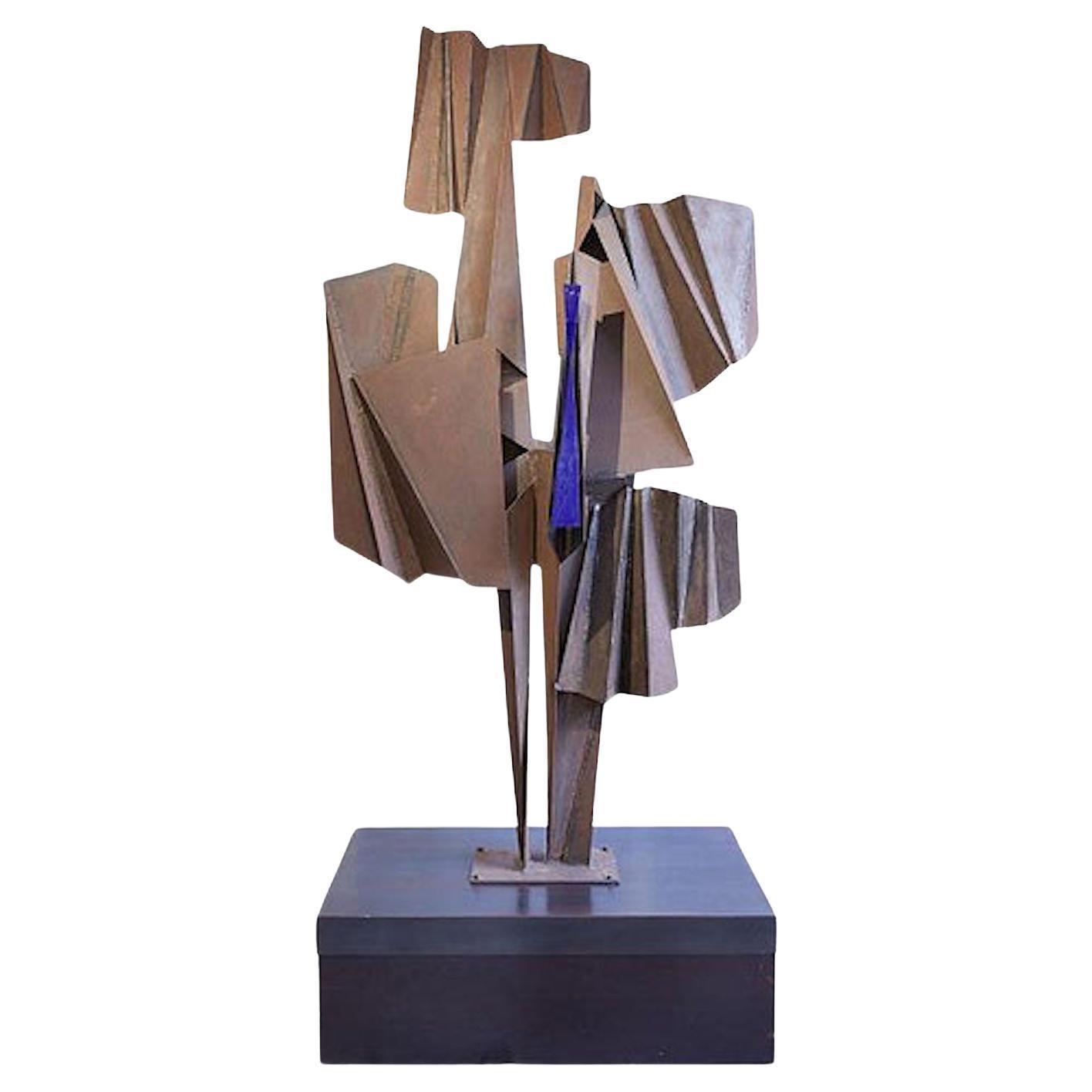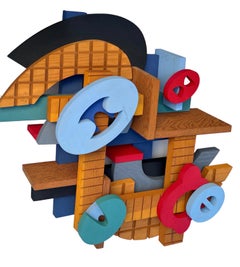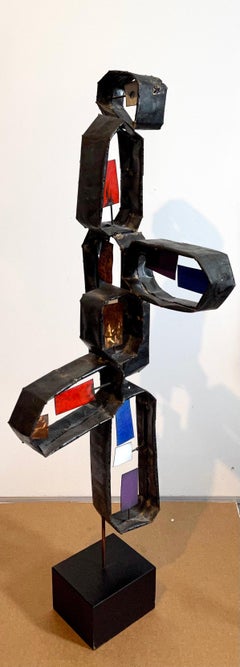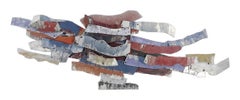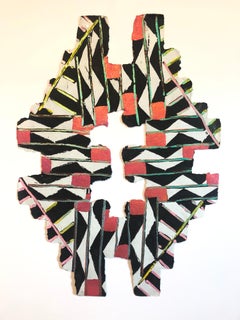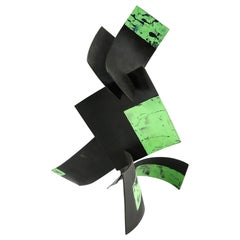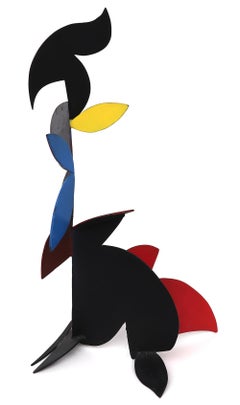Items Similar to Huge Dorothy Gillespie Colorful Abstract Expressionist Enamel Painted Sculpture
Want more images or videos?
Request additional images or videos from the seller
1 of 15
Dorothy GillespieHuge Dorothy Gillespie Colorful Abstract Expressionist Enamel Painted Sculpture2001
2001
$7,500
£5,686.93
€6,524.84
CA$10,671.58
A$11,576.26
CHF 6,087.44
MX$140,859.63
NOK 76,102.83
SEK 71,774.31
DKK 48,716.27
About the Item
Dorothy Gillespie (1920 – 2012)
Ribboned Image X
2001
Metal Ribbon Sculpture, Enamel on Aluminum with colorful striped green ribbons.
Dimensions: 71"H X 21"W, X 21"D
Provenance: Harmon Meek Gallery in Naples, Florida and bears their label underneath.
Hand signed on base.
Large tree like sculpture.
Dorothy Gillespie (1920 – 2012) was an American artist and sculptor who became known for her large and colorful abstract metal sculptures. Gillespie became best known for the aluminum sculptures she started to produce at the end of the 1970s. She would paint sheets of the metal, cut them into strips and connect the strips together to resemble cascades or starbursts of bright colored ribbon. The New York Times once summarized her work as “topsy-turvy, merrymaking fantasy,” and in another review declared, “The artist’s exuberant sculptures of colorful aluminum strips have earned her an international reputation.Her works are featured at her alma mater (Radford University) in Virginia, where she later returned to teach, as well as in New York (where she was artist in residence for the feminist Women's Interart Center), Wilmington, North Carolina and Florida.
She enrolled both at Radford University near her hometown, and the Maryland Institute College of Art in Baltimore, Maryland. The director of the Maryland Institute, Hans Schuler, helped foster her career in fine art.
On June 5, 1943, aged 23, Gillespie moved to New York City. There she took a job at the B. Altman department store as assistant art director. She also joined the Art Students League where she was exposed to new ideas about techniques, materials, and marketing. She also created works at Atelier 17 printmaking studio, where Stanley William Hayter encouraged to experiment with her own ideas. Many of the great artists of the day worked there including, Jackson Pollock, Mark Rothko, Louise Bourgeois, Louise Nevelson, Krishna Reddy, Zarina Hashmi and Mauricio Lasansky. Significant women artists wo worked there include Minna Citron, Dorothy Dehner,
Sue Fuller, Alice Trumbull Mason and Anne Ryan. She and her husband, Bernard Israel, opened a restaurant and night club in Greenwich Village to support their family. She returned to making art in 1957, and worked at art full-time after they sold the nightclub in the 1970.
In 1977 Gillespie gave her first lecture series at the New School for Social Research, and she would give others there until 1982. She taught at her alma mater as a Visiting Artist (1981-1983) and gave Radford University some of her work to begin its permanent art collection. Gillespie then served as Woodrow Wilson visiting Fellow (1985-1994), visiting many small private colleges to give public lectures and teach young artists. She returned to Radnor University to teach as Distinguished Professor of Art (1997–99).[8] She also hosted a radio program, the Dorothy Gillespie Show on Radio Station WHBI in New York from 1967-1973.
Gillespie began moving away from realism and into the abstraction that marked her career. Gillespie returned to New York City in 1963 to continue her career. She maintained a studio through the 70s and advocate worked towards feminist goals in the art industry, picketing the Whitney Museum, helping to organize the Women's Interart Center, curating exhibitions of women's art, and writing articles raising awareness of her cause. Gillespie numbered among her acquaintances such art-world luminaries as Jackson Pollock, Lee Krasner, Alice Neel, Louise Nevelson and Georgia O’Keeffe. “She had amazing stories that unfortunately are gone,” her son said.
During the 1960s, she built multimedia art installations that made political statements, such as 1965’s “Made in the USA,” that used blinking colored lights, mirrors, shadow boxes, rotating figures and tape recordings to convey a chaotic look at American commercial fads. The floor was strewn with real dollar bills, which visitors assumed were fake.
By the 1980s, Gillespie's work had come to be known internationally. She completed many commissions for sculptures in public places, including Lincoln Center, Rockefeller Center and Walt Disney World Epcot Center in Orlando, Florida. Her work bears affinities to Memphis Milano as well as Tom Holland in her use of bright saturated colors. This piece might be a sort of Postmodern Christmas Tree. Her work is in many collections across the United States, including the Delaware Museum, the Solomon R. Guggenheim Museum, and the National Museum of Women in the Arts. Her sculptures can also be found in the Frankfurt Museum in Germany and the Tel Aviv Museum in Israel.
Group Shows Conceived and Curated by Dorothy Gillespie
Women's Interart Center, New York, NY 1974 included: Betty Parsons, Elsie Asher, Alice Baber, Minna Citron, Nancy Spero, Seena Donneson, Alice Neel, Natalie Edgar, Dorothy Gillespie, and Anita Steckel. Alice Baber, Isabel Bishop, Audrey Flack, Mary Frank, Buffie Johnson, Yvonne Jacquette, Lila Katzen, Elaine De Kooning, Joyce Weinstein. "Women Artists Paint Women Artists," Virginia Miller Gallery, Miami, FL 1978;
"Artist Choice," Clayworks Gallery, New York, NY 1979, included: Marisol, Joyce Weinstein, Marlyn Dintenfass, Clinton Hill, Joe Stallone, Peter Voulkos, David Hare, Susan Weil, Philip Pavia, Ka Kwong Hui, Jack Beal, Jolyn Hofsted, Terry Rosenberg, Bernie Kirschenbaum.
Her Postmodernist work is unique in its use of ribbon-like shape and use of bright colors. Her sculptures are crafted out of aluminum covered in enamel. Her Colorfall, is a 40-foot tall sculpture hanging in the lobby of Wilmington's Thalian Hall Center for the Performing Arts. During her lifetime, the Women's Caucus for Art awarded Gillespie its Outstanding Services award in 2001. Dorothy Gillespie died in Coral Gables, Florida on Sunday September 30, 2012. She established a foundation to continue her work and the women's art movement after her death.
- Creator:Dorothy Gillespie (1920 - 2012, American)
- Creation Year:2001
- Dimensions:Height: 71 in (180.34 cm)Width: 21 in (53.34 cm)Depth: 21 in (53.34 cm)
- Medium:
- Movement & Style:
- Period:
- Condition:minor wear, please see photos.
- Gallery Location:Surfside, FL
- Reference Number:1stDibs: LU38216988602
About the Seller
4.9
Platinum Seller
Premium sellers with a 4.7+ rating and 24-hour response times
Established in 1995
1stDibs seller since 2014
1,815 sales on 1stDibs
Typical response time: 1 hour
- ShippingRetrieving quote...Shipping from: Surfside, FL
- Return Policy
Authenticity Guarantee
In the unlikely event there’s an issue with an item’s authenticity, contact us within 1 year for a full refund. DetailsMoney-Back Guarantee
If your item is not as described, is damaged in transit, or does not arrive, contact us within 7 days for a full refund. Details24-Hour Cancellation
You have a 24-hour grace period in which to reconsider your purchase, with no questions asked.Vetted Professional Sellers
Our world-class sellers must adhere to strict standards for service and quality, maintaining the integrity of our listings.Price-Match Guarantee
If you find that a seller listed the same item for a lower price elsewhere, we’ll match it.Trusted Global Delivery
Our best-in-class carrier network provides specialized shipping options worldwide, including custom delivery.More From This Seller
View AllLarge Abstract Wood Sculpture Colorful Wooden Painting John Okulick Wall Hanging
By John Okulick
Located in Surfside, FL
John Okulick, large colorful wood wall sculpture construction
"Perfect Harmony"
Hand signed and dated, 1999
Dimensions: H: 52 inches:...
Category
1990s Contemporary Abstract Paintings
Materials
Metal
Italian Mid Century Mod Large Brutalist Welded Copper Enamel Sculpture Wood Base
Located in Surfside, FL
Welded, brazed, copper (based on the weight, this might be iron or bronze) with colorful inset enamel plaques on a painted wood base. A studio handmade Brutalist sculpture in a mann...
Category
Mid-20th Century Abstract Abstract Sculptures
Materials
Metal, Copper, Enamel
Huge Untitled Painted Metal Assemblage Sculpture, aluminum with nuts and bolts
By Robert Goodnough, 1917-2010
Located in Surfside, FL
Robert Arthur Goodnough (AMERICAN, 1917-2010)
Untitled
oil on aluminum with nuts and bolts
Provenance: Christie's Auction House from the estate of William F. Buckley and Patricia ...
Category
20th Century Abstract Expressionist Abstract Sculptures
Materials
Metal
Abstract Modernist Colorful Mixed Media Art Screen-print Handmade Shaped Paper
By Sandy Kinnee
Located in Surfside, FL
Title: Guide
32 color screenprint on 100% rag handmade, shaped deckle edged paper. with applied glitter.
hand signed in pencil, stamped and numbered from edition of 33.
Sandy Kinnee...
Category
1980s Abstract Expressionist Abstract Prints
Materials
Paint, Ink, Handmade Paper
Mid Century Modern Brutalist Welded Abstract Expressionist Sculpture
Located in Surfside, FL
Neo-Dada Abstract Sculpture: Assemblages
In contrast, abstract sculpture followed a slightly different course. Rather than focusing on non-figurative subject matter, it concentrated...
Category
Mid-20th Century Abstract Expressionist Abstract Sculptures
Materials
Metal
Organic Abstract Cast Paper Sculpture Relief Painting Suzanne Anker
By Suzanne Anker
Located in Surfside, FL
"Cocoon (1990)" by Suzanne Anker
Suzanne Anker (born August 6, 1946) is an American visual artist and theorist. Considered a pioneer in Bio Art. She has been working at the relationship of art and the biological sciences for more than twenty five years. Her practice investigates the ways in which nature is being altered in the 21st century. Concerned with genetics, climate change, species extinction and toxic degradation, she calls attention to the beauty of life and the "necessity for enlightened thinking about nature’s 'tangled bank'.” Anker frequently works with "pre-defined and found materials"botanical specimens, medical museum artifacts, laboratory apparatus, microscopic images and geological specimens.
Suzanne Anker was born in Brooklyn, New York on August 6, 1946. She earned a B.A. in Art from Brooklyn College of the City of New York and an M.F.A. from the University of Colorado in Boulder (1976). She also completed independent Studies with Ad Reinhardt (1966-1967) and studied at the Brooklyn Museum Art School (1968). She lives with the artist Frank Gillette in Manhattan and East Hampton, NY.
During the mid 70s to the mid 80s, Anker worked almost exclusively on sculptural handmade paper reliefs. She started papermaking in 1974 on the basis of reading Dard Hunter's and Claire Romano's books. In 1975 she worked with Garner Tullis at the Institute of Experimental Printmaking in Santa Cruz, California. The paper reliefs produced at his institute were exhibited at the Martha Jackson Gallery in New York City in 1976.[ The same year, she participated in the North American Hand Papermaking exhibition organized by Richard Minsky at the Center for Book Arts in New York City.
From a background as a printmaker, Anker initially worked with cast paper, made in latex molds. Subsequently, she incorporated limestone and fossils in her experiment with combinations of paper and stone. For her 1979 solo exhibition at the Walker Art Center, Anker installed large limestone planks that extended from the interior to the exterior of the gallery. The same year, she presented an installation of limestone and its residual chalk dust at P.S. 1’s "A Great Big Drawing Show" curated by Alanna Heiss with artists Vito Acconci, Alice Aycock, Frank Gillette, Sol LeWitt, Robert Morris, Bruce Nauman, Dennis Oppenheim, Richard Serra, and others.
Suzanne Anker is considered "one of the pioneers in the broader field of art, science, and technology", particularly in the burgeoning field of Bio Art.
In 1994, Suzanne Anker curated Gene Culture: Molecular Metaphor in Visual Art – one of the first art exhibitions on the subject of art and genetics – at Fordham University’s Lincoln Center Campus in New York. The exhibition investigated "the ways in which genetic imaging operates as aesthetic signs".
From 2004 to 2006, Suzanne Anker hosted twenty episodes of the Bio-Blurb Show, a 30-minute-long internet radio program originally broadcast on WPS1 Art Radio, in collaboration with MoMA. The show focused on the intersection of art and the biological sciences, and the ethical and aesthetic dimensions therein. It is currently archived on Alanna Heiss’ Clocktower Productions.
In 2006, Anker co-curated the exhibition Neuroculture: Visual Art and the Brain, at the Westport Arts Center with Giovanni Frazzetto. The exhibition presented an investigation of aspects of the human brain, and its attendant representations.
Suzanne Anker is the Chair of the School of Visual Arts (SVA)'s BFA Fine Arts Department in New York City (2005-present). She previously chaired the SVA BFA Art History Department (2000-2005). In 2011, Anker founded the SVA Bio Art Lab, the first Bio Art laboratory in a Fine Arts Department in the United States. The SVA Bio Art Lab is located in Chelsea, New York City and has been conceived as a place where "scientific tools and techniques become methodologies in art practice".
Anker has participated in lectures and symposia in prominent institutions around the world, including Harvard University, Boston; University of Cambridge, Cambridge, UK; Yale University, New Haven; Art-Sci UCLA, Los Angeles; Maryland Institute College of Art (MICA), Baltimore; Rensselaer Polytechnic Institute, New York; Museum of Arts and Design, New York; Nanyang Technological University, Singapore; London School of Economics, London; European Molecular Biology Laboratory- EMBL, Monterotondo, Italy; Max Planck Institute of Molecular Cell Biology and Genetics, Dresden; Leiden University, NL; Hamburger Bahnhof, Berlin; Dundee Contemporary Arts, Dundee; Courtauld Institute of Art, London; Banff Art Center, Alberta; The National Academies of Sciences, Engineering, and Medicine, Washington, D.C.; Berlin-Brandenburg Academy of Sciences and Humanities, Berlin;[ University of Amsterdam, NL; New York Academy of Sciences, Institute for the Humanities, New York University; DLD, Munich.
Selected artworks
Gene Pool
Anker’s interests in the natural world extended her investigation into the microscopic domain of chromosomes and genes. Appropriating scientific images, she created Gene Pool in 1991, a body of work that includes suspended pigment on large vellum sheets and expansive sculptural arrays employing metallic fibers of stainless steel, copper, aluminum and bronze.
Other works that reflect scientific representations of chromosomes include Chromosome Chart of Suzanne Anker –a presentation of her own DNA sequence as a self-portrait– and Cellular Script, in which she displays chromosome patterns as a kind of calligraphy.
Biota (2011) is a sculptural installation by Suzanne Anker composed of porcelain sculptures and silver-leaf figurines. The porcelain objects are fabricated by immersing natural sea sponges into a mixture of kaolin, feldspar, and quartz. "The organic material of the sponge burns away in the process, leaving behind only the perfect replica of nature".
Exhibitions
Selected one-person exhibitions
"The Biosphere Blues Mending an Unhinged Earth", O'NewWall, Seoul, Korea (2017).
“Culturing Life”, Sam Francis Gallery...
Category
1990s Abstract Sculptures
Materials
Mixed Media
You May Also Like
Apocalypse- Abstract Sculpture, Brightly Colored Geometric Intertwined Form
Located in Chicago, IL
Robert Segal’s abstract sculpture offers a particularly fertile ground for experiments in shape, color, proportion, and technique. He steps away from non-traditional sculpting method...
Category
1990s Abstract Abstract Sculptures
Materials
Fiberglass, Acrylic
Yellow and Blue Make Green - Tall Modern Abstract Figurative Sculptural Artwork
Located in Los Angeles, CA
Nebraka-based Jamie Burmeister is a sculptural artist known for his original artworks incorporating original small bronze figures, standing at just up to 4 inches tall. His unique fi...
Category
21st Century and Contemporary Contemporary Abstract Paintings
Materials
Bronze
Michael Anderson Abstract Painted Steel Sculpture, Late 20th Century
Located in Norwalk, CT
Michael Anderson, American (b. 1945),
Painted steel sculpture, circa late 20th century. Initialed underneath.
Known for bright, colorful steel sculp...
Category
Late 20th Century American Abstract Sculptures
Materials
Steel
Edward Arcenio Chavez Abstract Painted Metal Sculpture, Mid-Century Modern Art
By Edward Arcenio Chavez
Located in Denver, CO
This striking abstract painted metal sculpture by Edward (Eduardo) Arcenio Chavez (1917–1995) is a vibrant example of mid-century modern design. Rendered in bold black and the three primary colors—red, blue, and yellow, the piece exudes energy and movement, showcasing Chavez’s mastery of abstract expressionism and dynamic form. Measuring 16 ½ x 7 x 11 inches, it is a powerful tabletop sculpture that brings a sophisticated, colorful focal point to any interior space.
About the Artist:
Eduardo Chavez...
Category
20th Century Abstract Abstract Sculptures
Materials
Metal
Palm Springs Totem Large - Colorful Abstract Playful Modern Resin Sculpture
By Nayla Saroufim
Located in Los Angeles, CA
Nayla Saroufim creates installations that challenge the traditional notion of the passive viewer. Nayla’s art is a rich mix of media. She was always captivated by the dialogue betwee...
Category
21st Century and Contemporary Contemporary Abstract Sculptures
Materials
Resin, Mixed Media
Monumental Abstract Style and Enamel Abstract Sculpture by Alan Goldstein
Located in Montreal, QC
Monumental Abstract Style welded steel and cobalt blue enamel abstract sculpture by Alan Goldstein
His work is represented in over 70 private collections in the United States and...
Category
Vintage 1960s American Abstract Sculptures
Materials
Steel

